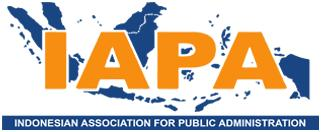Evaluation of the Challenges of E-Government Implementation: Analysis of the E-Government Development Index in Indonesia
Abstrak
The rapid development of information technology is the main driver for significant dynamics in the implementation of e-government. This study aims to present an analysis of the challenges of implementing e-government in Indonesia. This study used quantitative methods using secondary data. The results showed that the E-Government Development Index in Indonesia reached rank 77 in 2022 with a good sub-index score: 0.76 for the Online Service Index, 0.64 for the Telecommunication Infrastructure Index, and 0.74 for the Human Capital Index. The conclusion of this study shows that some of the challenges of implementing E-Government,, namely lack of data integration, minimal public participation, and lack of understanding of technical aspects and information security among Human Resources (HR), especially the State Civil Apparatus. Based on these problems, there are several research implications to improve information technology infrastructure better and more evenly distributed throughout Indonesia, namely: (1) expanding accessibility and improving digital infrastructure in Indonesia, (2) providing assistance and training to each local government and civil servants on the use and benefits of technology in the government system to provide optimal public services, and (3) support and prioritize the integration of the National Data Center to collect all data from regions, ministries, and institutions nationally in one Big Data.
Kata Kunci
Teks Lengkap:
PDF (English)Referensi
Adams, S. O., & Paul, C. (2023). E-government development indices and the attainment of United Nations sustainable development goals in Africa: A cross-sectional data analysis. European Journal of Sustainable Development Research, 7(4), em0234. https://doi.org/10.29333/ejosdr/13576
Afni, I. N. (2021). Optimization Of E-Government In Public Services In The Era Of The Covid-19 PandemiC. Proceedings of Scientific Papers Slamet Riyadi Conference on Public Administration (SRIPA), 7823–7830.
Apriliyanti, I. D., Kusumasari, B., Pramusinto, A., & Setianto, W. A. (2021). Digital divide in ASEAN member states: analyzing the critical factors for successful e-government programs. Online Information Review, 45(2), 440–460. https://doi.org/10.1108/OIR-05-2020-0158
Arief, V. (2023). E-Government in Southeast Asia: A Comparison of E-Government Development in Singapore, Malaysia and Indonesia. Social Issues Quarterly, 1(2), 345–362.
BAPPENAS. (2020). Digital Government Development. Development Digital Government, 29. http://www.wantiknas.go.id/wantiknas-storage/file/img/kajian/POLICY PAPER 3 - Digital Government.pdf
Bilal, J. T. (2017). Ensuring Transparency and Access To Information in the Management of Public Institutions Through E-Government. Proceedings of the 11Th International Management Conference: The Role of Management in the Economic Paradigm of the Xxist Century (Imc 2017), 88–98.
Chun, S. A., Shulman, S., Sandoval, R., & Hovy, E. (2010). Government 2.0: Making connections between citizens, data and government. Information Polity, 15(1–2), 1–9. https://doi.org/10.3233/IP-2010-0205
Fakhrul Umam Hadi, Tri Yuniningsih, E. L. (2023). Implementation Of E-Government Through Dukcapil Smart Application In Bantul Regency. Journal Of Public Policy And Management Review, 12(3), 537-550., 12(3), 537–550. https://doi.org/10.21608/pshj.2022.250026
Fiqri, M. H., Pranoto, W. J., Gaung, B., Putra, O., Irvan, M. N., Laksana, W., Ir, J., No, H. J., Ulu, K. S., Samarinda, K., & Timur, K. (2024). Implementation of Web Record Management System at DPMPTSP Samarinda City Using Laravel Framework University of Muhammadiyah East Kalimantan Results of previous research on Implementation of Academic Information Systems in the development of infor systems. 3(1).
Gafar, T. F. (2017). Change Management In Information And Communication Technology (Ict) Government In Indonesia (A thought in welcoming the transition of e-government to e-Governance). CosmoGov, 3(2), 153. https://doi.org/10.24198/cosmogov.v3i2.14726
Gupta, R., Muttoo, S. K., & Pal, S. K. (2020). Regional E-governance development index for developing nations. Digital Government: Research and Practice, 1(3). https://doi.org/10.1145/3386163
HANDIKA, R. (2017). Employee Performance Before And After Based On E-Government. https://digilib.unila.ac.id/29693/2/Tesis Without A Discussion Chapter.pdf
Hasanah, U., & Sukri, M. (2023). Implementation of Digital Literacy in Islamic Education: Challenges and Solutions. Equilibrium: Journal of Education, 11(2), 180. http://journal.unismuh.ac.id/index.php/equilibrium
Heriyanto, H. (2022). The Urgency of Implementing E-Government in Public Services. Musamus Journal of Public Administration, 4(2), 066–075. https://doi.org/10.35724/mjpa.v4i2.4128
Irawan, B. (2013). Study Analysis of the Concept of E-Government: A New Paradigm in Public Services. Journal of Paradigm, 2(1), 54–68.
Ivanova, M., Kulkaev, G., & Tanina, A. (2023). Improving the UN Methodology of the E-Government Development Index. In Lecture Notes in Networks and Systems: Vol. 684 LNNS (Issue September). Springer Nature Switzerland. https://doi.org/10.1007/978-3-031-32719-3_9
Jopang, Zulfiah Larisu, S. D. (2023). Public Service Management in North Buton District. Jurnal Public Service Management,07(02). https://doi.org/http://dx.doi.org/10.24198/jmpp.v7i2.49901 Public
Jubaedah, E. (2020). Development of Electronic Government in Developing Countries Its Role and Readiness. In Journal of Performance Discourse: A Practical-Academic Study of Public Service Performance and Administration (Vol. 6, Issue 2, pp. 29–38). http://103.85.61.66/ojs/index.php/jwk/article/view/530
Kabbar, E. F. (2021). A comparative analysis of the e-government development index (EGDI). 14th International Conference on ICT, Society, and Human Beings, ICT 2021, 18th International Conference on Web Based Communities and Social Media, WBC 2021 and 13th International Conference on e-Health, EH 2021 - Held at the 15th Multi-Conference on Comp, 23–29. https://doi.org/10.33965/ict2021_202106l003
Katharina, R. (2021). Indonesia's public services & digital government. Yayasan Pustaka Obor Indonesia.
Kencono, B. D., Putri, H. H., & Handoko, T. W. (2023). Digital Government Transformation: Challenges in the Development of Electronic-Based Government Systems (SPBE) in Indonesia. JIIP - Scientific Journal of Educational Sciences, 7(2), 1498–1506. https://doi.org/10.54371/jiip.v7i2.3519
Kneuer, M. (2016). E-democracy: A new challenge for measuring democracy. International Political Science Review, 37(5), 666–678. https://doi.org/10.1177/0192512116657677
Kusuma, A. A., Wasistiono, S., & Pitono, A. (2021). Implementation of E-Government in Improving the Quality of Public Services at the Investment Office and One-Stop Integrated Services in Bandung City, West Java Province “Implementation Of Egovernment In Improving The Quality Of Public Service In Department Of Inves. Visioner, 13(2), 145–157.
Lea, J., & Stenson, K. (2007). Non-State Governance “ From Below ”. 22(2), 9–27.
MácHová, R., Volejníková, J., & Lněnička, M. (2018). Impact of E-government Development on the Level of Corruption: Measuring the Effects of Related Indices in Time and Dimensions. Review of Economic Perspectives, 18(2), 99–121. https://doi.org/10.2478/revecp-2018-0006
MenpanRB, H. (2020). Ministry of State Apparatus Empowerment and Bureaucratic Reform - UN Survey Results, Indonesia's 'e-Government' Rises in Ranking. In Menpan.Go.Id.
Meuleman, J., Kwok, W. M., & Aquaro, V. (2022). Open Government Data for Sustainable Development: Trends, Policies and Assessment: Continuing the Pilot Assessment of the Open Government Data Index (OGDI). In ACM International Conference Proceeding Series (Vol. 1, Issue 1). Association for Computing Machinery. https://doi.org/10.1145/3560107.3560149
Nations, U. (2023). Methodology. Public Administration UN. https://publicadministration.un.org/egovkb/en-us/About/Overview/-E-Government-Development-Index
Nugraha, J. T. (2018). E-Government and public services (study of successful elements of e-government development in Sleman district government). Journal of Communication and Media Studies,32–42. https://www.academia.edu/download/64644054/228481721.pdf
Olphert, W., & Damodaran, L. (2007). Citizen participation and engagement in the design of e-government services: The missing link in effective ICT design and delivery. Journal of the Association for Information Systems, 8(9), 491–507. https://doi.org/10.17705/1jais.00137
Ordiyasa, I. W. (2015). Failure Of E-Government Implementation In Developing Countries. Journal of National Seminar on Informatics, 3(1), 6–8.
Parsaorantua, P. H., Pasoreh, Y., & Rondonuwu, S. A. (2017). Implementation of information and communication technology (Study on web e-government in Kominfo Manado City). Acta Diurna Communication,6(3), 187–195.
Prakrit Silal, D. S. (2021). Explaining Country Heterogeneity in E-Government Evolution Based on Longitudinal Analysis of Nations. International Journal of Technology Diffusion (IJTD), 12(3). https://doi.org/10.4018/IJTD.2021070105
Pratama, A. B. (2016). Managing The Image Of Government Organizations In The Digital Era. Performance Discourse, 21(November), 1–318.
Puspitaningrum, L. (2021). The Role of States in Reducing Digital Inequality: A South African Case Study. Journal Centrist,2(1), 39–58. https://doi.org/10.26593/sentris.v2i1.4518.39-58
Romayah, S., Suroso, A. I., & Ramadhan, A. (2014). Evaluation of the implementation of E-Government in XYZ Agencies. Journal of Management Applications (JAM), 12(4), 612–620.
Roziqin, A., Kismartini, Fajrina, A. N., Salahudin, & Sulistyaningsih, T. (2022). The development of Indonesian e-Government: A bibliometric analysis. COLLNET Journal of Scientometrics and Information Management, 16(1), 49–74.
Sarjito, A. (2023). Impact of Digitalization of Rural Administration in Developing Countries. Scientific Journal of Administrative Sciences,13(2), 106–124. https://doi.org/10.33592/jiia.v13i2.3814
Schandl, H., & West, J. (2010). Resource use and resource efficiency in the Asia-Pacific region. Global Environmental Change, 20(4), 636–647. https://doi.org/10.1016/j.gloenvcha.2010.06.003
Siwi, T. P. U., & Nawawi, Z. (2023). Building Citizen Satisfaction Towards E-Government Services: A Conceptual Framework. Journal of Public Service Management, 6(2), 253. https://doi.org/10.24198/jmpp.v6i2.46471
Sudirman, F. A., & Saidin, S. (2022). E-Government and Sustainable Development: A Review of Systematic Literature. Skipper: Journal of Government Science,21(1), 44–58. https://doi.org/10.35967/njip.v21i1.269
Sukarno, M., & Nurmandi, A. (2023). E-Government Development Index Impact on World Governance Indicator Index in Southeast Asian Countries. Journal of Contemporary Governance and Public Policy, 4(1), 97–114. https://doi.org/10.46507/jcgpp.v4i1.106
Sururi, A. (2017). Policy Innovation in Public Administration Perspective Towards the Realization of Good Public Policy Governance. Public Spirit: Journal of Public Administration,12(2), 14. https://doi.org/10.20961/sp.v12i2.16236
T Khairunnisa, A Nurmandi, I Muallidin, D. K. (2022). Analysis on Open Government in Southeast Asia During Pandemic. International Conference on Human-Computer Interaction.
Tanesia, R. K., Suryani, D., Yudha, F. M., & Ramba, J. (2017). Study Of Market Segmentation And Marketing Strategy Of Construction Services Business In Asean Countries (Case Study: Indonesia vs Philippines). Journal of Civil Engineering,13(3), 216–227. https://doi.org/10.24002/jts.v13i3.878
Tasyah, A., Septiya, S., Jasriyani Putri, S., Agung Fernanda, R., & Chesilia Azani, P. (2021). Best practice e-government policy in implementing public services in the new normal era. Journal of Social and Political Science Studies,1(1), 21–33. https://doi.org/10.35912/jasispol.v1i1.163
Tsebenko, O., Lukach, N., Zavada, Y., & Stadnichenko, O. (2022). Model for Assessing Development of E-Government in Eastern Partnership Countries. In Developments in Information & Knowledge Management for Business Applications, 5, 425–447.
Wahyu Sulistya, A. Q., Bastian Sulistiyo, B., Aditya, F., Aritonang, I. D., Amos Simangunsong, S., Shihab, M. R., & Ranti, B. (2019). A case study of indonesian government digital transformation: Improving public service quality through E-government implementation. Proceedings - 2019 5th International Conference on Science and Technology, ICST 2019. https://doi.org/10.1109/ICST47872.2019.9166234
Wang, N. C. L. L. X. (2022). Evaluation in Development of E-Government: Taking Macao E-Government as An Example. International Conference on Advanced Computer Theory and Engineering (ICACTE). https://doi.org/10.1109/ICACTE55855.2022.9943717
Wagola, R., Nurmandi, A., Misran, & Subekti, D. (2023). Government Digital Transformation in Indonesia. Communications in Computer and Information Science, 1835 CCIS(August), 286–296. https://doi.org/10.1007/978-3-031-36001-5_37
Wirawan, V. (2020). Application of E-Government in Welcoming the Era of Contemporary Industrial Revolution 4.0 in Indonesia. Journal of Law Enforcement and Justice, 1(1), 1–16. https://doi.org/10.18196/jphk.1101
Wong, W., & Welch, E. (2004). Does E-Government Promote Accountability? A Comparative Analysis of Website Openness and Government Accountability. Governance, 17(2), 275–297. https://doi.org/10.1111/j.1468-0491.2004.00246.x
Younus, M., Pribadi, U., Nurmandi, A., & Rahmawati, I. Z. (2023). Comparative analysis of E-Government Development Index: a case study of South Asian countries. Transforming Government: People, Process and Policy, 17(4), 552–574. https://doi.org/10.1108/TG-05-2023-0068
DOI: https://doi.org/10.24198/jmpp.v8i2.52759
Refbacks
- Saat ini tidak ada refbacks.
Jurnal Manajemen Pelayanan Publik Indexed By:



This work is licensed under a Creative Commons Attribution-ShareAlike 4.0 International License.


















21.png)



.png)